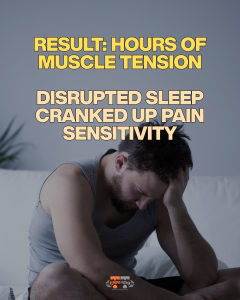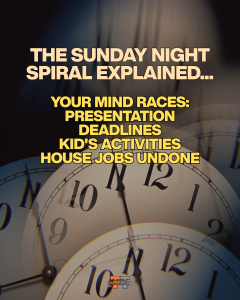The Stress-Back Pain Connection: Why Your Monday Morning Ache Isn’t What You Think
Why does your Monday morning back pain have nothing to do with your weekend workout?
Picture this. You had a sensible weekend – a gentle walk around Carlingford Lough, a bit of light gardening, nothing strenuous. You went to bed on Sunday feeling fine.
Then Monday hits. You wake up and your back feels like a truck ran over it. The familiar ache is there, maybe some stiffness or a tug down the leg when you bend to get the kids’ lunches ready.
Your first thought is, what did I do wrong this weekend?
Here’s what might surprise you: that Monday pain often has less to do with how you moved and more to do with how stressed you felt and what was waiting for you on Monday.

The Mind-Body Connection Is Real, Not Woo-Woo
When we talk about stress causing back pain, we’re not saying it’s “all in your head.” Your pain is real. Your experience is valid.
Your brain and your body are always talking. Sometimes that chat gets a bit heated.
Your nervous system’s main job is to keep you safe. When it senses a threat, it reacts the same way whether it’s a charging bull or a sharp email from your boss. Stress hormones rise, muscles tighten, breathing goes shallow, and your sensitivity to pain increases.
Over time, the system can become more reactive. It starts to treat normal sensations as danger. Think of a smoke alarm that goes off with a bit of steam from the shower – that’s how a sensitised system behaves.
Central Sensitisation Explained Simply
Central sensitisation is your nervous system becoming hypersensitive. Research from pain science experts like Dr David Hanscom and Dr John Sarno shows that chronic stress doesn’t just make existing pain worse – it can actually create pain where none existed before.
When you’re stressed, your brain releases inflammatory chemicals that sensitise nerve endings and make your pain receptors more reactive. At the same time, stress disrupts sleep, which prevents your body from producing natural painkillers and interferes with tissue repair and recovery.
Why Mondays Often Hurt
Let’s make this real.
It’s Sunday night. You’re in bed. Your mind starts racing – the presentation, the deadline, the tough call you’ve been putting off, kids’ schedules, house jobs that didn’t get done.
Your nervous system doesn’t split hairs between real threats and imagined ones. It just sees stress, so it prepares for battle.
Tension builds in the neck, shoulders, and lower back. Sleep gets choppy. Even if you don’t notice it, your body does.
By Monday morning you’ve spent hours bracing. No wonder your back feels awful.
Poor sleep makes this worse. Even one bad night can nudge pain sensitivity up the next day. Add work stress, family pressure, and the usual Monday chaos, and you have a perfect storm.

John’s Sunday Night Spiral
A client – let’s call him John – came to me convinced his pain was random. Good week, then bang, Monday would floor him.
He works in project management. Every few weeks a big deadline would land. On Sunday nights he would lie awake rehearsing slides, running worst-case scenarios, watching his to-do list grow.
He thought he was being prepared. In reality he was winding his nervous system up like a spring.
Once we tracked it, the pattern was obvious. His pain wasn’t random – it was synced to stress cycles.
“I couldn’t understand why I’d feel fine all weekend, then wake up Monday in agony,” John told me. “I thought my mattress was broken or I’d slept wrong. Turns out my brain was the problem.”
When John started implementing stress management tools, the changes followed a predictable pattern:
Week 1: Sunday night sleep improved slightly
Week 2: Monday morning stiffness was less severe
Week 4: He’d gone three Mondays without waking up in pain
“It wasn’t dramatic,” he said. “But suddenly I wasn’t dreading Sunday nights anymore. And my back pain became much more predictable.”
The Science Behind Stress and Pain
Long-term stress can turn the pain volume up. It can also make you sleep worse, which reduces your body’s natural pain control and slows recovery. The cycle becomes: stress makes pain worse, pain makes stress worse, and sleep pulls both in the wrong direction.
The good news is simple: if stress can turn the knob up, you can learn to turn it down.
Research shows that even basic stress management techniques can significantly reduce pain sensitivity and improve sleep quality within weeks.
Three Quick Wins You Can Use Today
Tool 1: The 4-7-8 Breathing Reset
When stress or pain spikes, breathe in through your nose for 4, hold for 7, breathe out through your mouth for 8. Repeat 4 times. This nudges your system from fight-or-flight toward rest-and-digest.
This activates your parasympathetic nervous system – like hitting the reset button on your stress response.
Tool 2: The 10-Minute Walk Window
A gentle 10-minute walk lowers tension and steadies your head. Outside if you can – if you’re at home, loop around Carlingford village. If you’re in an office, a few flights of stairs will do. Daily beats occasional.
Movement is medicine for both stress and back pain, but it doesn’t have to be intense. Regular gentle movement can reduce cortisol levels and ease muscle tension.
Tool 3: The Sunday Night Boundary
Set a hard cut-off at 7pm on Sunday. No work emails. No planning. Give your brain permission to wind down. Keep a notepad by the bed. If a worry pops up, write it down and tell yourself you’ll handle it on Monday. That simple act often settles the mind.
This one tool alone has helped countless clients break the Sunday night spiral that leads to Monday morning pain.

Building Long-Term Resilience
Quick wins matter, but lasting change comes from routine.
Keep regular sleep and wake times, even at weekends. Set clear work-home boundaries. Have go-to tools ready before you need them.
You’ll never remove stress fully. The win is changing how your body responds to it.
When you build resilience, you help more than your back. You lift your energy, your mood, your patience with family, and your output at work.
The Bigger Picture
Managing stress isn’t only breathwork and walks. It can mean tough but healthy choices.
That might be a clearer boundary with a colleague, delegating that extra task, naming the conversation you’ve avoided, or sorting the small life stresses that quietly drain you.
Maybe you cannot swap jobs or remove family pressures. You can change your response. That’s where your power is.
Advanced Stress Management for Back Pain
Beyond the basic tools, consider these strategies:
Sleep Hygiene: Consistent bedtime routines, cool dark rooms, and avoiding screens before bed can dramatically improve sleep quality.
Mindfulness Practice: Even 5 minutes of daily meditation can reduce stress hormone levels and improve pain tolerance.
Social Support: Talking to friends, family, or professionals about stress can reduce its physical impact on your body.
Time Management: Often back pain flare-ups coincide with feeling overwhelmed. Better planning can reduce Sunday night anxiety.
When to Get Extra Help
If anxiety, low mood, or sleep problems stick around despite the basics, speak with your GP about counselling or therapy. There’s no shame in it. In fact, sorting mental health often helps physical pain a great deal.
Consider professional help if you experience:
- Persistent anxiety that interferes with daily life
- Sleep problems lasting more than a few weeks
- Overwhelming stress that doesn’t respond to basic management techniques
- Depression or mood changes affecting your relationships or work
Common Myths About Stress and Back Pain
“It’s all in my head”: Stress-related pain is real, measurable, and valid. The fact that stress contributes doesn’t make it imaginary.
“I should be able to handle this”: Everyone has limits. Seeking help for stress is a sign of strength, not weakness.
“Stress management is just relaxation”: Effective stress management often involves practical changes to how you work, communicate, and structure your life.
“If I ignore it, it’ll go away”: Chronic stress tends to accumulate and worsen over time without intervention.
The Integration Approach
The most effective approach to stress-related back pain addresses multiple factors simultaneously:
- Physical: Appropriate movement and exercise
- Nutritional: Anti-inflammatory diet choices
- Sleep: Consistent, quality rest
- Stress: Management techniques and lifestyle changes
- Psychological: Addressing fear-avoidance and catastrophic thinking
This integrated approach produces better results than focusing on any single factor alone.

Reassurance and Moving Forward
If someone has told you your pain is just stress, it can feel dismissive. Let me be clear: stress-linked pain is not imaginary. It’s not weakness. It’s your nervous system trying to protect you.
You don’t need to choose between stress tools and physical rehab. The best results come when you work both sides together.
Remember, building resilience takes time. Start with one tool – perhaps the Sunday night boundary – and add others gradually. Small, consistent changes often produce better long-term results than dramatic overhauls.
Ready for a Complete Solution?
If you want to break the stress-pain cycle with a complete plan, that’s exactly what my BackFix Coaching programme provides.
My 5-Pillar System bakes stress and sleep optimisation into the same plan as training, mobility, nutrition, and smart progression. Because your back doesn’t live in a silo – we need to address all the factors working together.
This isn’t for everyone. I work with committed individuals who are ready to build long-term resilience rather than just manage symptoms.
If you’re ready to address all five pillars as one integrated system, email me at info@templetownsc.com or DM me STRONG on Instagram @TempletownStrengthConditioning.
Want to explore this topic further?
🎧 Listen to the full podcast episode: Episode 12 – The Stress-Back Pain Connection (And How to Break It)
📧 Get the free Stress Toolkit: DM me TOOLKIT on Instagram for breathing exercises, sleep optimisation tips, and a daily journal prompt to help spot your stress patterns.
You deserve to train smarter, not broken.

